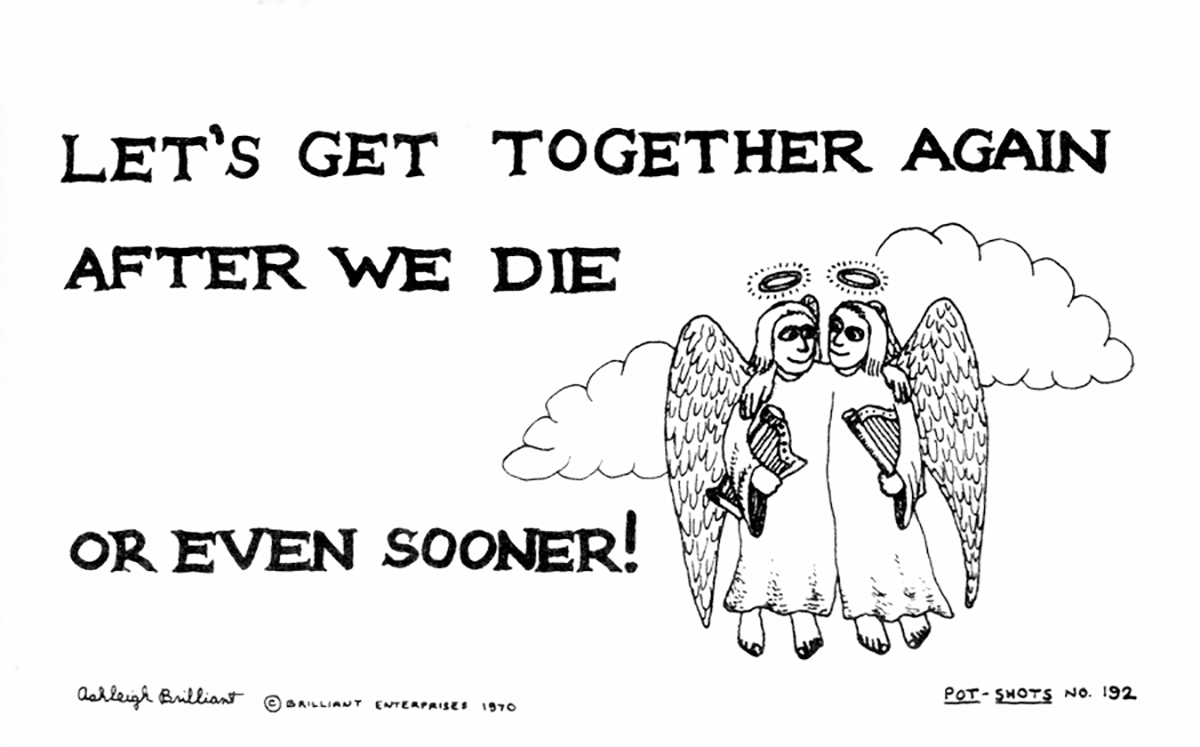Blessings On You

The idea of blessing – that is, asking God to have some favorable influence on someone or something, is probably as old as religion itself. In some religions, only certain people are authorized to pronounce certain blessings – but in general, in our culture, anybody may, without any special permission, bless any other person, or thing, or any abstraction, such as a country. In fact, one very popular anthem, which we all know, calls on God to “Bless America,” and nobody seems to consider that objectionable.
But we must also acknowledge the opposite sentiment, which is, of course, condemning someone or something to Hell, which is also known as cursing or damning. So, the reverse of blessing anything capable of being blessed would be asking God to damn that same individual or object. From this, we derive an expletive linking God and damnation, which is so strong, and, to many of us, so offensive, that even today it is not considered acceptable in polite discourse.
This, however, has not always been the case. As long ago as the series of conflicts between England and France known as the Hundred Years’ War (1337-1453), the English, presumably because of their supposed fondness for the expression, were known to their enemies as “Les Goddams.”
Gilbert and Sullivan, in their comic opera HMS Pinafore, (1878) had fun with this idea by first having the ship’s Captain declare that: “Bad language or abuse I never, never, use whatever the emergency.” But later he himself is disgraced by being heard to say, in very stressful circumstances involving his own daughter and a lowly seaman, “Why damme, it’s too bad!” For this offence, he is exiled to his cabin by the First Lord of the Admiralty (who happens himself to be interested in the Captain’s daughter.) When he protests, the First Lord responds:
I will hear of no defense –
Attempt none, if you’re sensible –
That word of evil sense
Is wholly indefensible.
So, it no longer mattered whether you were wishing damnation upon someone else or even upon yourself. Better not to say anything derogatory that even sounded like “damn”– hence the popular new uses of similar-sounding but inoffensive words like “darn,” (which of course had nothing to do with sewing). And along the same lines, we also have “dashed,” “gosh dang,” and even “doggone.”
On the other hand, “Blessing” has had a whole euphemistic life of its own. In England and some other English-speaking countries, the word “bloody” has been, and, by some people, still is, considered extremely blasphemous. This usage derives from the religious expression “By Our Lady.” So, having the same first two letters has long made “blessed” a more or less acceptable substitute.
In his play Pygmalion – first produced in 1914 – George Bernard Shaw took the daring step of having one of his characters – Eliza, the Cockney flower-girl – utter the expression, “Not bloody likely!” The play was not banned, nor the line cut out – but it set a new standard for outrageousness in the theater.
But, even to Americans, the word “damn” can legitimately be used in certain contexts, particularly in war. Thus, in the Civil War and afterwards, Southerners referred to their enemy as the “Damn Yankees,” and later the expression has found usage wherever the plural of “Yankee” occurs, particularly in baseball and on the stage. And a famous event in the war with Spain was Admiral Farragut’s attack upon Mobile Bay and his command to “Damn the torpedoes” (which were naval mines.)
Otherwise, it is hard to find any military usage of the word “damn” in that whole century. Certainly, one could scarcely imagine any such language escaping the lips of a gentleman warrior like Robert E. Lee.
By the time of World War II, however, at least one General – George Patton – became famous for his profanity, which apparently endeared him to most of his troops. (The rest were no doubt more afraid to say anything about it than they were of the Germans. That same General became notorious for his alleged slapping of a hospitalized soldier suffering from “Battle Fatigue,” who had no physical wounds – calling him a coward.)
Finally, the very words “God Bless You” were, as long ago as 590 A.D., ordained by the Pope to be uttered when someone had sneezed. Plagues were prevalent, and those words were thought to help stave off disease. What’s remarkable is that this, and similar sneeze-blessings, such as the German “Gesundheit!” (Good Health!) are still common today.







